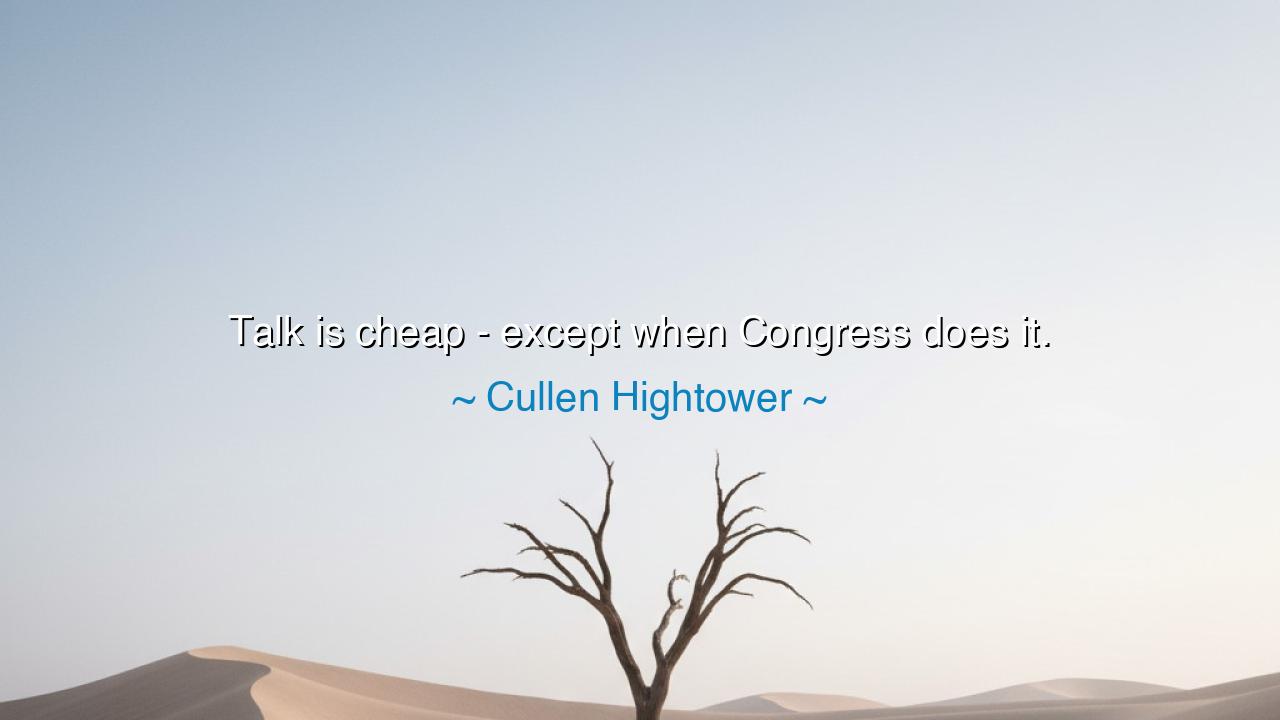
Talk is cheap - except when Congress does it.






In the age of political theater, when words flow like rivers and promises rise like smoke, the American humorist Cullen Hightower spoke with a wit that cut deeper than satire: “Talk is cheap — except when Congress does it.” With this single line, he laid bare the irony of modern governance — that those entrusted to speak for the people often spend not only their words, but the people’s treasure. Hightower’s jest, light on its surface, conceals a truth as sharp as steel: when talk becomes endless and action scarce, when rhetoric replaces responsibility, then speech itself becomes costly — not to the speaker, but to the nation that listens.
The origin of this quote rests in the mid-twentieth century, in an era when public confidence in government had begun to wane. Cullen Hightower, a veteran turned writer of epigrams, was a man who observed the follies of politics with the calm amusement of one who has seen too much to be deceived. His wit did not spring from malice, but from insight. In saying that “talk is cheap — except when Congress does it,” he mocked the extravagance of government deliberation — the endless debates, committees, hearings, and speeches that often lead to little change, yet consume vast amounts of time, money, and faith. His humor was the laughter of the wise — a reminder that words without results are not harmless; they are a debt the people must pay.
Yet Hightower’s remark transcends his time, for it speaks to a universal truth about power and responsibility. In every age, those who govern are tempted to confuse talk with action. The ancient kings issued decrees that glittered with grandeur but failed to heal the hunger of their subjects. The senators of Rome, in their final days of decadence, filled the Forum with eloquence while the Republic crumbled beneath their feet. Even now, in the modern halls of legislation, speeches are crafted with precision, yet solutions remain elusive. The danger lies not in speech itself, but in its emptiness — in the widening gulf between what is promised and what is done.
To understand the full weight of Hightower’s jest, consider the example of the Great Depression in the 1930s. For years before its worst depths, political leaders spoke at length about reform, about relief, about restoring prosperity. Yet it was not until action — real, decisive, courageous action — that change began to take hold. Words alone could not feed the hungry or employ the jobless. The nation learned, as all must, that eloquence without effort is a luxury the desperate cannot afford. Thus, the truth behind Hightower’s humor: when those in power mistake talk for labor, the people pay the price.
And yet, his words are not merely an accusation; they are also a warning to every citizen. For government reflects the governed. When the people accept noise in place of wisdom, spectacle in place of service, and slogans in place of substance, they, too, become complicit in the cost of talk. A Congress that speaks much and acts little is not merely the failure of its members — it is the symptom of a nation that has grown comfortable with words over deeds. The price of empty speech is not measured only in taxes or deficits, but in the erosion of trust and the fading of hope.
Still, Hightower’s irony carries a hidden encouragement: that the remedy for cheap talk lies in honest action. The ancients taught that the strength of a republic rests not in the beauty of its oratory, but in the virtue of its citizens. If the people demand substance over show, integrity over rhetoric, then even the most gilded speeches will lose their charm. It is the duty of every generation to hold its leaders accountable — to measure them not by their words, but by their works. For in the end, a government that speaks less but acts justly is far nobler than one that promises much and delivers little.
The lesson, then, is both simple and profound: beware of the costly talk of power. Words can inspire, but they can also deceive; they can guide, but they can also lull. Demand of every leader, and of yourself, that speech be followed by purpose, and promise by performance. Let your own words be few and faithful, your commitments firm and fulfilled. For though talk may be cheap, the trust of the people — once squandered — is the most expensive treasure a nation can lose.
So, my children of tomorrow, remember the wit and wisdom of Cullen Hightower: “Talk is cheap — except when Congress does it.” Laugh, yes — for laughter humbles the proud — but also listen to the truth within the jest. A free people must never be content with noise that costs them their future. Speak when you must, act when you should, and hold those who govern to the same eternal law: that the worth of words is measured not in their sound, but in their service to truth and to the common good.






AAdministratorAdministrator
Welcome, honored guests. Please leave a comment, we will respond soon